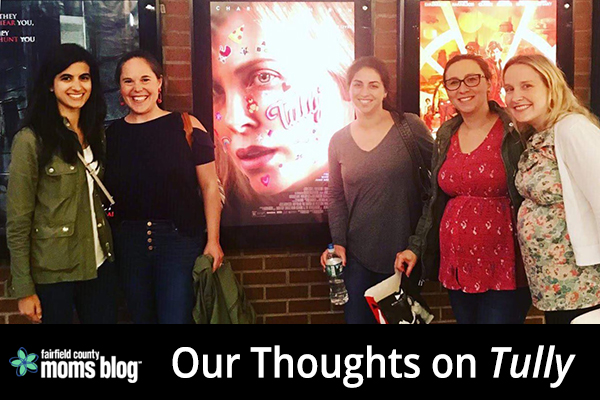As soon as I watched the trailer for Tully, I knew that I wanted to see the movie in theaters. And, who better to see Tully with than my fellow Fairfield County Moms Blog contributors? A few of us met for a moms’ night out, and we weren’t the only moms there with the same idea. When the lights came on at the end of the movie, a few groups of women all remained seated further discussing the film; there was a lot to discuss! If you haven’t seen it yet, or read the reviews, WARNING there are spoilers ahead! FYI Tully is being released later this month on some streaming services and DVD.

Jana:
Before our movie plan was finalized, another contributor shared this post, to let us know that Tully’s ending may be a sensitive topic for some of us moms. After I read it, I couldn’t stop! With each interview and review that I read, I found myself even more curious to see the movie and watch the story unfold. I’m not going to address the psychosis here, I’ll leave that to the professionals. Instead, I’ll share one of my favorite takeaways from Tully.
As a new mom of three, Marlo (Charlize Theron) is struggling, until her amazing “night nurse,” Tully, saves her from the monotonous mayhem of motherhood (think: middle of the night wake-ups, feedings, and diaper changes). Juggling three small children is no small task, I often feel like a circus act trying to keep up with my two! Tully remains calm, cool and collected, often looking on the bright side of motherhood. Tully is often in awe of Marlo’s motherhood journey, and according to the twist, Tully is a young Marlo.
Perspective is everything. Many of us moms are currently living out our dreams of motherhood, but it’s so easy to lose sight of that when your kids are begging for snacks and you’re folding your umpteenth load of laundry!
Maria F.:
Beautiful is honestly the first adjective that comes to my mind about this movie. In terms of actual film techniques, the dream scenes with mermaids had a magically haunting and freeing quality. The loop of hearing crying baby, turning on light, nursing and changing baby just settled into my soul, reminding me of what would come again in a few short months. Yes, there were very dark parts, but as a viewer watching Charlize Theron portray a mom’s postpartum struggles, I was overcome with empathy. While I didn’t experience any form of depression with my first two children, I know I could with my last baby. I know people who have experienced and survived it.
Theron brought to life strength in the midst of trauma. Her character was a great mother trying her best. She needed help and she attempted to help herself. Her self-help wasn’t enough, but I had hope from the ending. I don’t see the movie as perpetuating stigmas. I actually see it as the opposite. It opens the door for conversation and for us to really examine how outside help, both from family and medical professionals, is necessary.
Alisa:
As a psychotherapist who specializes in postpartum mental health, I knew I had to catch a glimpse at the movie that was producing so much hype and media attention, particularly from the perinatal field. After viewing the film I had a few reactions:
1) First and foremost I was glad that maternal mental health was at the forefront. With 1 in 7 new moms affected by maternal mental health issues (such as anxiety, depression, OCD, psychosis, bipolar, and PTSD), I was happy to see that this film would raise awareness of the issue.
2) I was concerned for how the movie ended. In reality, postpartum psychosis (which is what was being portrayed in the film) is a medical crisis. If someone walks into my office and is displaying signs of being actively psychotic, they are to be sent to the Emergency Room immediately for evaluation. Why? Because Postpartum Psychosis can be very fatal, leading to devastating consequences including infanticide and/or suicide. In the film, Marlo was hospitalized but there was never mention of an actual diagnosis. And most importantly, there was never talk of her being discharged with professional help or medication. The film gives the false hope that it just gets better. Postpartum psychosis isn’t something that can just be ignored and go away.
3) The main character’s delusions were ones that were harder to pick up on because they weren’t all that bizarre. Her reality was that she had a night nurse. In reality, psychosis is often displayed by much more erratic behavior and more “out there” delusions. Common ones can be the belief that the baby is possessed or is the son of God. In this film, it was easier for the main character to get by day to day without people noticing.
4) I wondered if the writers understood what they were portraying. I wondered if they realized they were portraying a mother who was experiencing Postpartum Psychosis or how educated they were on Postpartum mental health. I wondered if they consulted with specialists in the perinatal field.
Have you seen Tully yet? Tell us your thoughts in the comments!


























